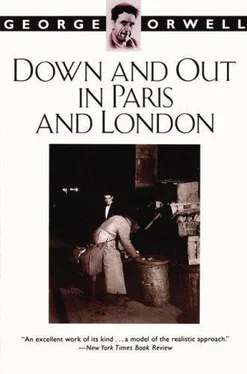George Orwell - Down and Out in Paris and London
Здесь есть возможность читать онлайн «George Orwell - Down and Out in Paris and London» весь текст электронной книги совершенно бесплатно (целиком полную версию без сокращений). В некоторых случаях можно слушать аудио, скачать через торрент в формате fb2 и присутствует краткое содержание. Жанр: Старинная литература, на русском языке. Описание произведения, (предисловие) а так же отзывы посетителей доступны на портале библиотеки ЛибКат.
- Название:Down and Out in Paris and London
- Автор:
- Жанр:
- Год:неизвестен
- ISBN:нет данных
- Рейтинг книги:5 / 5. Голосов: 1
-
Избранное:Добавить в избранное
- Отзывы:
-
Ваша оценка:
- 100
- 1
- 2
- 3
- 4
- 5
Down and Out in Paris and London: краткое содержание, описание и аннотация
Предлагаем к чтению аннотацию, описание, краткое содержание или предисловие (зависит от того, что написал сам автор книги «Down and Out in Paris and London»). Если вы не нашли необходимую информацию о книге — напишите в комментариях, мы постараемся отыскать её.
Down and Out in Paris and London — читать онлайн бесплатно полную книгу (весь текст) целиком
Ниже представлен текст книги, разбитый по страницам. Система сохранения места последней прочитанной страницы, позволяет с удобством читать онлайн бесплатно книгу «Down and Out in Paris and London», без необходимости каждый раз заново искать на чём Вы остановились. Поставьте закладку, и сможете в любой момент перейти на страницу, на которой закончили чтение.
Интервал:
Закладка:
be thousands at the least. As to Paddy, it was actually the
best life he had known for two years past. His interludes
from tramping, the times when he had somehow laid
hands on a few shillings, had all been like this; the
tramping itself had been slightly worse. Listening to his
whimpering voice-he was always whimpering when he was
not eating-one realised what torture unemployment must
be to him. People are wrong when they think that an
unemployed man only worries about losing his wages; on
the contrary, 'an illiterate man, with the work habit in his
bones, needs work even more than he needs money. An
educated man can put up with enforced idleness, which is
one of the worst evils of poverty. But a man like Paddy,
with no means of filling up time, is as miserable out of
work as a dog on the chain. That is why it is such
nonsense to pretend that those who have "come down in
the world" are to be pitied above all others. The man who
really merits pity is the man who has been down from the
start, and faces poverty with a blank, resourceless mind.
It was a dull time, and little of it stays in my mind,
except for talks with Bozo. Once the lodging-house was
invaded by a slumming-party. Paddy and I had been out,
and, coming back in the afternoon, we heard sounds of
music downstairs. We went down to find
three gentle-people, sleekly dressed, holding a religious
service in our kitchen. They were a grave and reverend
seignior in a frock coat, a lady sitting at a portable
harmonium, and a chinless youth toying with a crucifix. It
appeared that they had marched in and started to hold
the service, without any kind of invitation whatever.
It was a pleasure to see how the lodgers met this
intrusion. They did not offer the smallest rudeness to the
slummers; they just ignored them. By common consent
everyone in the kitchen-a hundred men, perhaps behaved
as though the slummers had not existed. There they stood
patiently singing and exhorting, and no more notice was
taken of them than if they had been earwigs. The
gentleman in the frock coat preached a sermon, but not a
word of it was audible; it was drowned in the usual din of
songs, oaths and the clattering of pans. Men sat at their
meals and card games three feet away from the
harmonium, peaceably ignoring it. Presently the slummers
gave it up and cleared out, not insulted in any way, but
merely disregarded. No doubt they consoled themselves by
thinking how brave they had been, "freely venturing into
the lowest dens," etc. etc.
Bozo said that these people came to the lodginghouse
several times a month. They had influence with the police,
and the "deputy" could not exclude them. It is curious
how people take it for granted that they have a right to
preach at you and pray over you as soon as your income
falls below a certain level.
After nine days B.'s two pounds was reduced to one and
ninepence. Paddy and I set aside eighteenpence for our
beds, and spent threepence on the usual tea-andtwo-
slices, which we shared-an appetiser rather than a meal.
By the afternoon we were damnably hungry and
Paddy remembered a church near King's Cross Station
where a free tea was given once a week to tramps. This
was the day, and we decided to go there. Bozo, though it
was rainy weather and he was almost penniless, would not
come, saying that churches were not his style.
Outside the church quite a hundred men were waiting,
dirty types who had gathered from far and wide at the
news of a free tea, like kites round a dead buffalo.
Presently the doors opened and a clergyman and some
girls shepherded us into a gallery at the top of the church.
It was an evangelical church, gaunt and wilfully ugly, with
texts about blood and fire blazoned on the walls, and a
hymn-book containing twelve hundred and fifty-one
hymns; reading some of the hymns, I concluded that the
book would do as it stood for an anthology of bad verse.
There was to be a service after the tea, and the regular
congregation were sitting in the well of the church below.
It was a week-day, and there were only a few dozen of
them, mostly stringy old women who reminded one of
boilingfowls. We ranged ourselves in the gallery pews and
were given our tea; it was a one-pound jam jar of tea each,
with six slices of bread and margarine. As soon as tea was
over, a dozen tramps who had stationed themselves near
the door bolted to avoid the service; the rest stayed, less
from gratitude than lacking the cheek to go.
The organ let out a few preliminary hoots and the service
began. And instantly, as though at a signal, the tramps
began to misbehave in the most outrageous way. One
would not have thought such scenes possible in a church.
All round the gallery men lolled in their pews, laughed,
chattered, leaned over and flicked pellets of bread among
the congregation; I had to re
strain the man next to me, more or less by force, from
lighting a cigarette. The tramps treated the service as a
purely comic spectacle. It was, indeed, a sufficiently
ludicrous service-the kind where there are sudden yells of
"Hallelujah!" and endless extempore prayersbut their
behaviour passed all bounds. There was one old fellow in
the congregation-Brother Bootle or some such name-who
was often called on to lead us in prayer, and whenever he
stood up the tramps would begin stamping as though in a
theatre; they said that on a previous occasion he had kept
up an extempore prayer for twenty-five minutes, until the
minister had interrupted him. Once when Brother Bootle
stood up a tramp called out, "Two to one 'e don't beat
seven minutes!" so loud that the whole church must hear.
It was not long before we were making far more noise than
the minister. Sometimes somebody below would send up
an indignant "Hush!" but it made no impression. We had
set ourselves to guy the service, and there was no
stopping us.
It was a queer, rather disgusting scene. Below were the
handful of simple, well-meaning people, trying hard to
worship; and above were the hundred men whom they had
fed, deliberately making worship impossible. A ring of
dirty, hairy faces grinned down from the gallery, openly
jeering. What could a few women and old men do against a
hundred hostile tramps? They were afraid of us, and we
were frankly bullying them. It was our revenge upon them
for having humiliated us by feeding us.
The minister was a brave man. He thundered steadily
through a long sermon on Joshua, and managed almost to
ignore the sniggers and chattering from above. But in the
end, perhaps goaded beyond endurance, he announced
loudly:
"I shall address the last five minutes of my sermon to
the
unsaved sinners!"
Having said which, he turned his face to the gallery
and kept it so for five minutes, lest there should be any
doubt about who were saved and who unsaved. But much
we cared! Even while the minister was threatening hell
fire, we were rolling cigarettes, and at the last amen we
clattered down the stairs with a yell, many agreeing to
come back for another free tea next week.
The scene had interested me. It was so different from
the ordinary demeanour of tramps-from the abject worm-
like gratitude with which they normally accept charity.
The explanation, of course, was that we outnumbered the
Читать дальшеИнтервал:
Закладка:
Похожие книги на «Down and Out in Paris and London»
Представляем Вашему вниманию похожие книги на «Down and Out in Paris and London» списком для выбора. Мы отобрали схожую по названию и смыслу литературу в надежде предоставить читателям больше вариантов отыскать новые, интересные, ещё непрочитанные произведения.
Обсуждение, отзывы о книге «Down and Out in Paris and London» и просто собственные мнения читателей. Оставьте ваши комментарии, напишите, что Вы думаете о произведении, его смысле или главных героях. Укажите что конкретно понравилось, а что нет, и почему Вы так считаете.












